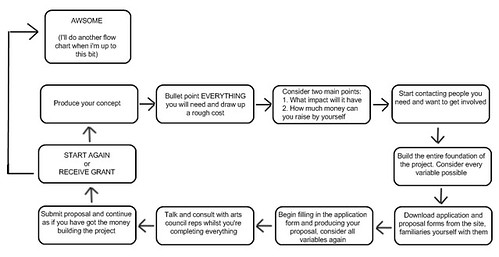To help fund Operation:Concrete I’m applying for an Arts Council grant. I want to apply for about £5000 which is the mark at which it’s still classed as a ‘small project,’ although this whole thing feels anything but small.
This is the first of many posts, my initial thoughts on the whole process really. Hopefully video blogs – depending on sponsorship which I’ll talk about in my next post – on the subject will be coming as well, including, how I’m going about applying, what resources are available and just how difficult it is, etc.
I’d like this blog to become a bit of a resource for future applicants. As helpful as the ‘how to apply document is,’ you can tell it’s been written by committee and passed on to a copywriter. Not necessarily by someone who has gone through the process, whilst they are actually going through it.
So far it’s been daunting, as the saying goes, ‘the hardest thing is getting started’ and that’s no lie. There’s three basic elements:
- The application form comes in at 41 pages and as you’d expect, needs some serious detail including all budgetary requirements, down to the last penny.
- On the side of that you need a minimum of 2000 word proposal document, which details everything you’re doing and want to achieve, with who and why.
- Then there’s personal CV and a few other little things like that.
So there’s no time for messing about. Once you’ve got it handed in it’s six weeks before you get a reply and the chances of you being successful are 50/50, although, personally I like those odds.
Starting at the beginning, there’s a bit of a flow chart at the bottom of the post, that I’ve put together off the back of the amount of time and work I’ve put into it so far – i.e. not much. You can get a bigger version by clicking on the image.
So, as you can see, there’s a few basic elements you have to be thinking about from the start. Then every one of these things potentially has an impact on the other thing, they’re all interlinked around a tight budget, people and yourself that you’re trying to pull together. It’s tough.
There's some general pointers as well, which, with my project, I immediately tick off. I’ve heard about these from a few sources that have either worked with, or won Arts Council money previously, so consider these at the same time;
- Collaborative project –How many different art forms does your project bring together? Mine is art, music and the written word. More mediums = more people interested and 'benefitting' from your project.
- Sponsorship – How much money can you raise on your own two feet. This will need to be about 50% of your overall budget from what I've experienced so far.
- Environmental –The Arts Coucil are big on it being as environmentally sound as possible, so do your best to consider that at all corners.
- Benefital to the public – This is the main point really, who will benefit from your project, they ask for exact numbers in the application form, so consider this all the time.
I’m at the start of the real hard work now, I seem to have been saying ‘I’m at the start’ over and over again, and I keep achieving things and it still remains the start, but that’s the way it is. It’s one big hill that until you’re on top of, you still have to climb, there won’t be any intermittent part from what I can tell.
But I've actually got the ball rolling now, the hardest part is figuring out, ‘where to start’ I literally had no idea. I needed a venue to host the launch night and exhibition, but you can't get that without the bands, and vice versa. You can't get the money without the whole thing basically being in place, but I can’t get things in place and booked without the money. It's difficult, but I'll be addressing every point as I go along.
There’ll be loads more posts on the application process from here on in, and the project as a hole. Next steps include building a brand around my product, which will be interesting. Oh, and the whole, getting bands, artists involved, nailing sponsorship, budgeting everything and revising / proofing the novel itself.
But we're moving, and it feels awesome.


